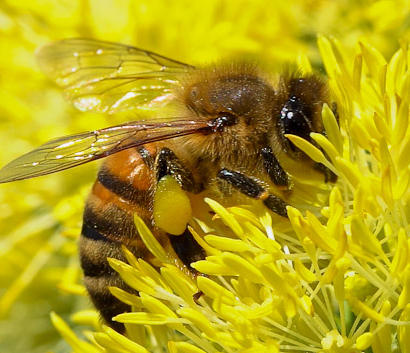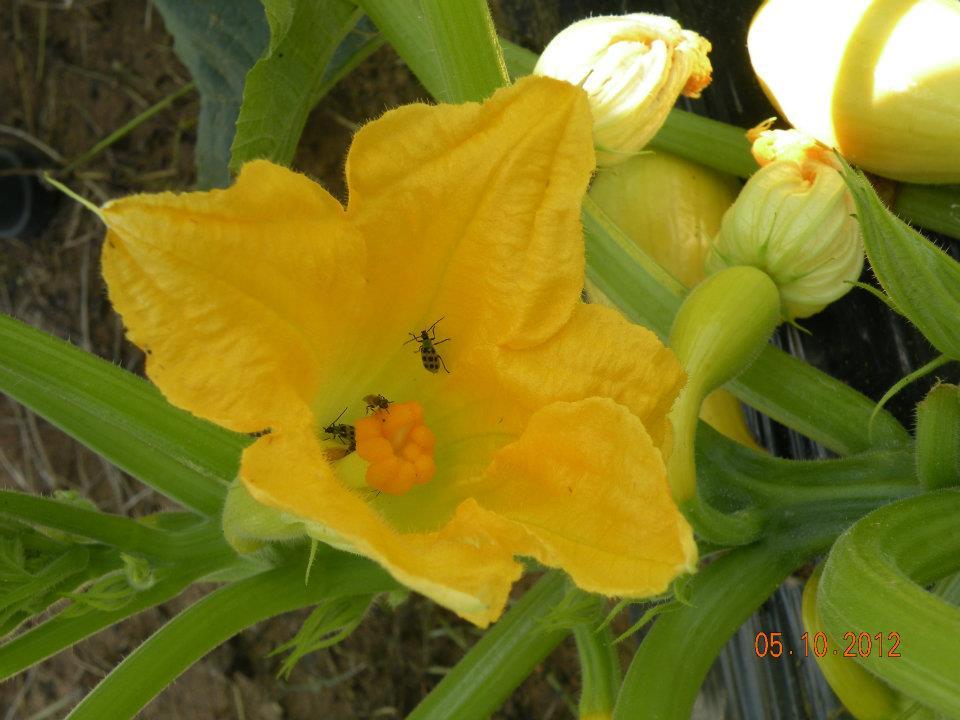Feral Colonies May Hold Key to Honeybee Health

Tulsa beekeeper Hollie Dalenberg is banking on a hunch that feral honeybees – those from managed colonies that have escaped or swarmed into the wild – may be more likely to survive high pest and disease loads through natural selection. Those wild colonies may hold the key to better bee health in managed hives.
Dalenberg has received a $20,000 Producer Grant to test her theory. By capturing feral colonies, monitoring them for survivability and honey production, and measuring their health metrics, she hopes to increase the survival rates of managed hives, increase honeybee productivity and boost beekeeper profitability with best management practices.
Pests, such as the varroa mite and the small hive beetle, are an ongoing problem for beekeepers whose infected hives can collapse leading to colony death, or the bees swarm, leaving the colony for a new location.
“Either way, the honeybee colonies are lost to the beekeeper,” said Dalenberg. Feral colonies can pose a health risk by spreading diseases and insects to existing colonies, but they can also be more resilient to pests and diseases and more adapted to the climate.
“Understanding feral honeybee pest and disease loads would give a better idea of the diseases in Oklahoma honeybees and how they are affecting managed hives,” said Dalenberg.
In the two-year project, Dalenberg will test feral colonies for the Varroa mite, small hive beetle, wax moth and American cockroach. Diseases such as acute bee paralysis, chronic bee paralysis virus, deformed wing virus, and slow bee paralysis may also be tested through laboratory analysis. Some invertebrates also share space with honeybees that may not pose a health threat or may even been beneficial. These include ants, spiders, stickbugs, and earwigs.
“Properly identifying these invertebrates will allow beekeepers to know when to treat or when not to treat based on the relationship that the invertebrate has with the honeybee,” said Dalenberg.
Removing feral colonies from the environment may be beneficial in several ways: By removing potential honeybee and native bee pests; by removing unwanted competition for floral resources to managed honeybee and native bee species; and by obtaining free honeybee colonies that are well adapted to the local ecosystem and disease landscape.
State Contacts
SARE State Coordinators are vital for expanding sustainable agriculture training for Extension, NRCS, and other agricultural professionals, who will then help producers transition to a more sustainable agriculture.
SARE IN OKLAHOMA

million
The Oklahoma Sustainable Agriculture Research and Education (SARE) is a professional development program sponsored by the Southern Region SARE and co-coordinated by Oklahoma State and Langston universities. We are committed to the sustainability of agriculture through economic viability, sound environmental and natural resource management, and awareness and recognition of social acceptability.
The Oklahoma Cooperative Extension Service provides technical information and educational programs designed to help Oklahoma agricultural producers as they implement strategies and practices to improve the sustainability of their agricultural operations.
Much of the technical information is derived from research-based knowledge generated by the Oklahoma Agricultural Experiment Station at Oklahoma State University and the Langston University Research Program, as well as through the Land Grant University network around the country. These institutions employ a myriad of means to promote the sustainability of agriculture including: basic and applied research projects, training for cooperative extension field staff and personnel from many of the agencies and non-governmental entities working with agricultural producers, educational programs and demonstrations for producers, written information, one-on-one producer assistance, business development and planning, pilot plant operations, and much more.
What We Do
Coordinate
Oklahoma SARE is mandated by the Southern SARE professional development to coordinate sustainable agriculture professional development efforts in Oklahoma. The program works with other sustainable agriculture entities to achieve its mission.
Educate
Oklahoma SARE is committed to spreading the principles and practices of sustainable agriculture through education in various channels including class room education, workshops, demonstrations and travel workshops.
Inform
We share information about sustainable agriculture research, extension and education opportunities with extension, NRCS, NGOs , growers, and community groups who would like to promote sustainable agriculture in Oklahoma. Oklahoma SARE thrive to ensure all agricultural communities in the state get information about grant opportunities from SARE and elsewhere in timely manner.
The OkSARE program is co-coordinated by two faculty members from each institution and is supported by an assistant extension specialist who oversees the day-to-day activities of the program.
Recent News From Oklahoma
 Row Covers (for Pests)
Row Covers (for Pests)
Using Row Covers to Protect Squash from Insect Pests
DURANT, Oklahoma -- Using row covers on squash protects the vegetable crop from insect pests such as the squash bug, but timing of their removal can impact pollination and subsequent plant yields, according to Oklahoma State University research. In a two-year study, horticulturist Jim Shrefler analyzed pest and pollinator incidences and measured squash yields using […]


